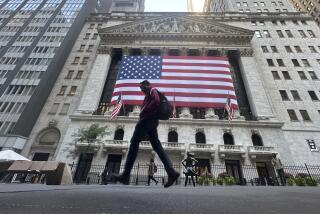JPMorgan Chase 4th-quarter profit grows to $3.3 billion, but loan losses raise concern
- Share via
The latest earnings report from JPMorgan Chase & Co. provides a rough snapshot of the U.S. economy: Although Wall Street has roared its way back to financial might, much of mainstream America is still recovering from the Great Recession.
JPMorgan Chase said Friday that its fourth-quarter earnings rose fourfold over the same period last year, enabling it to provide average pay of $121,124 for its 222,000 employees -- and $378,599 for members of its elite investment banking division.
The bank reported net income of $3.3 billion for the fourth quarter and $11.7 billion for 2009, or more than double what it made in 2008. The bank said profit was driven by its investment banking and private equity divisions.
But in addition to being a Wall Street player, JPMorgan Chase is also a major consumer bank, with credit card and retail banking operations, including the branch network it acquired with the collapse of Washington Mutual Inc. last year.
The bank reported fourth-quarter losses from these units, reflecting the continuing difficulty that Americans are having in paying off their credit card and mortgage debts.
The retail division, which is responsible for mortgages, lost $399 million in the quarter. In the previous quarter the division made a profit.
The credit card division lost $306 million, while the number of credit card holders making delinquent payments over 90 days increased from 2.8% to 3.6% from the third to fourth quarter of last year.
“There is a dichotomy at this time between performance in the investment bank and in the consumer side, where losses still remain high,” said Shannon Stemm, a bank analyst at Edward Jones and Co. in St. Louis. “It really shows us that the short-term environment is still tough for the consumer.”
JPMorgan didn’t offer much hope for a quick turnaround.
“While we are seeing some stability in delinquencies, consumer credit costs remain high and weak employment and home prices persist,” Chairman Jamie P. Dimon said in a statement. “Accordingly, we remain cautious.”
Although its earnings overall were strong, the bank’s hazy outlook for the coming year spooked investors and triggered a sell-off on Wall Street, with the Dow Jones industrial average falling 100.90 points Friday to 10,609.65. JPMorgan shares slipped $1.01, or 2.3%, to $43.68.
JPMorgan is the first of the big banks to release its fourth-quarter earnings, and because of its size investors have been looking for indications of what lies ahead next week, when nearly all of the other banks will release their fourth-quarter and full-year earnings.
The earnings were released one day after President Obama proposed a new tax on JPMorgan and other big financial firms to recoup much of the government’s $117 billion in projected losses from the $700-billion Troubled Asset Relief Program. Obama said that if these companies “are in good enough shape to afford massive bonuses,” they could afford to pay back taxpayers.
JPMorgan has paid back the $25 billion in TARP money it received, but that has done little to quell criticism of its outsized pay packages.
The bank has put aside $26.9 billion for 2009 employee compensation, topping the previous mark by nearly $4 billion.
“It’s tough to make the case that bankers who got a huge help from Uncle Sam and the taxpayers should be paid huge pre-meltdown-era compensation figures -- compensation that even surpasses what they were doling out during the boom times,” said Amy Borrus, deputy director of the Council of Institutional Investors.
The bigger compensation pool can be partly explained by the fact that JPMorgan added nearly 40,000 employees after the company acquired Bear Stearns and Washington Mutual during the financial crisis.
In addition, in the fourth quarter JPMorgan dialed back the percentage that it put aside for compensation. Chief Financial Officer Michael Cavanagh said in a conference call with investors that the change was partly a response to the British move to tax large bonuses given to bankers who work in London. But analysts said the bank was also sensitive to the public and political outrage over large banker bonuses.
Despite these fourth-quarter changes, JPMorgan’s overall pay pool for 2009 is still up substantially from both 2008 and 2007.
For the year, employees in the 25,000-person investment banking division will be given $9.3 billion, or 33% of the revenue. This percentage figure, while lower than recent years, is artificially low because employees will also be paid with company stock, which does not appear in the earnings report released Friday.
In December, Goldman Sachs Group Inc. announced that its top 30 executives’ bonuses would be paid only with stock.
nathaniel.popper@
latimes.com
More to Read
Inside the business of entertainment
The Wide Shot brings you news, analysis and insights on everything from streaming wars to production — and what it all means for the future.
You may occasionally receive promotional content from the Los Angeles Times.










